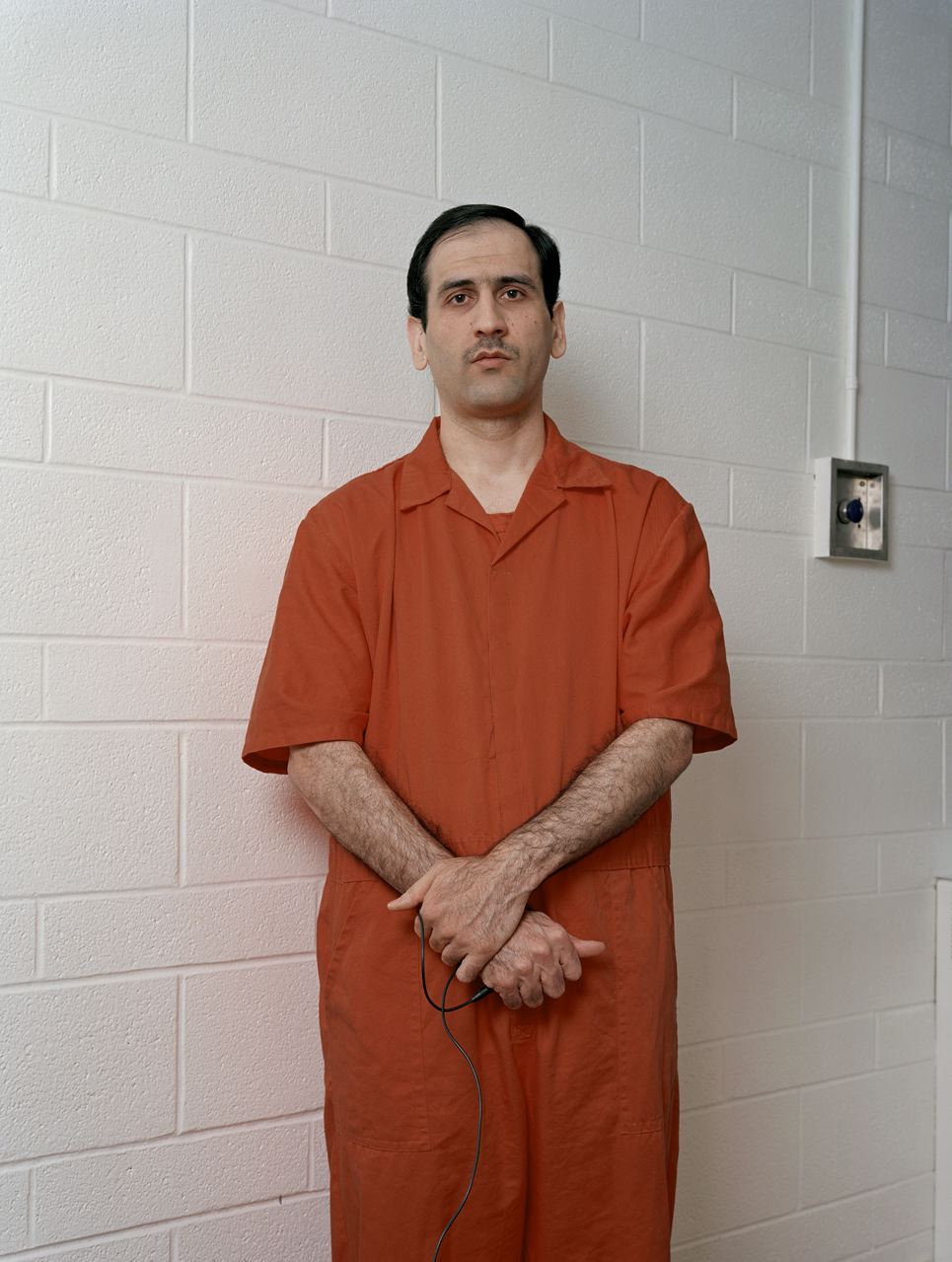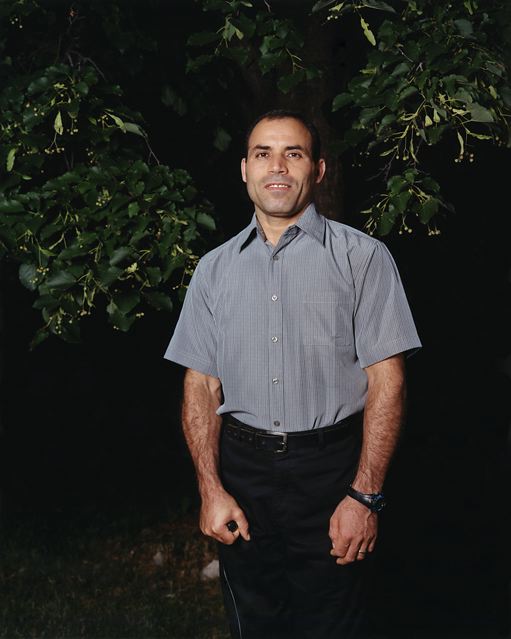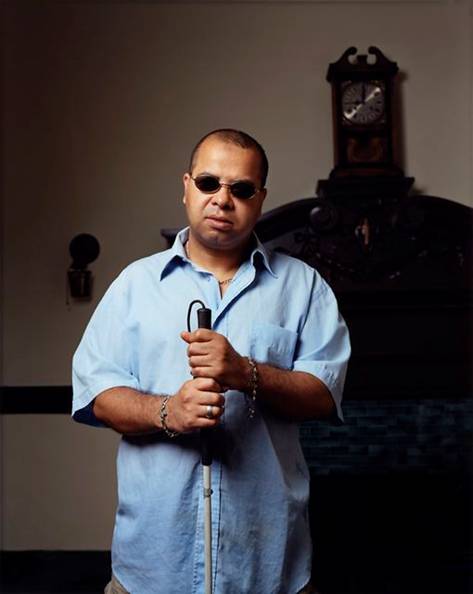
Darren Ell, born in 1961, was raised in Regina, Saskatchewan. He initially studied Political Science and World Religions at the University of Alberta, Edmonton and then continued at the University of Regina in Education and French Literature. He currently lives in Montreal where he is pursuing an MFA in photography at Concordia University. His photographs and interviews have been published by La Presse, the Toronto Star, the National Post, Alternatives, Citizenshift (National Film Board of Canada), Canadian Dimension, and broadcast on CBC-Radio-Canada, ZNET, Electronic Intifada and HaitiAction.net. Between States is Darren Ell’s first major solo exhibition.
Between States - Context - by Maria Worton
Mahmoud Jaballah and Hassan Almrei are only two of the subjects featured in Darren Ell’s exhibit, Between States. They are also two of the three “security certificate” detainees in Canada’s Guantanamo North and they are now on hunger strike. Today, December 29 th, is the 23 rd day they are refusing food, for among other reasons, the right to medical treatment and personal safety.
Between States uses life-sized color portraits, accompanied by biographical detail and recorded interviews, to starkly and vividly draw our attention to the Kafkaesque plight of these people. As “security certificate” detainees they live under the constant threat of deportation to torture and are being detained indefinitely, spanning years and without charge for alleged links to terrorism that go undisclosed as so called secret evidence.
Ell’s images also serve as so many windows through which various individuals without legal status challenge viewers to understand their unique circumstances. They ask that we bear witness to what it means to live in their private limbo of limited rights and opportunities and under continual threat of deportation to possible persecution.
Notably, there are a quarter of a million people living like this in Canada. Not that you’ll hear much about them from mainstream media. Although it’s surely newsworthy that many of them are living through situations that frequently put Canada in violation of its own Charter of Rights and Freedoms, as well as the UN Convention Against Torture.
In Between Sates Ell gave the most vulnerable subjects, those under threat of terrorist allegations, Jaballah, Almrei and Mohamed Harkat, the choice of taking their own picture; they chose in favor. The limited size and selection of images featured here can only hint at the impact of their life-sized counterparts. An impact gleaned from qualities of gaze, stance and biography that suggest, though victimized, these people, are not victims. In each photographic moment of self-reference, and in each account of struggle for a right to a life, these individuals successfully refuse the status of victimhood.
Between States is an activist’s art. Art that is, as Ell puts it, “ created and sustained by an important collaboration between artist, subject and the solidarity organizations which work with them,” These are organizations that are calling for, among other things, the right to fair, open and transparent trials for “security certificate” detainees and an end to deportation to torture.
Photo Exhibit:
 |
|---|
| Hassan Almrei |
Hassan Almrei
Metro West Detention Centre, Toronto 2006
“They held a gun to my head : “We are the police. Turn your car off and get out of the car.” From that moment, my struggle started.”
Hassan was born in Syria in 1974. His family fled to Saudi Arabia to escape government persecution. At age 17, he joined the thousands of young Muslim youth recruited by the US and Saudi Arabia to form a proxy army against the Russians. Al-Qaeda scarcely existed at that point, and Hassan denies having had contact with it. He made several more trips to Central Asia, mostly to buy perfume and incense for his shop in Saudi Arabia. Since non-Saudis are not allowed to stay in the country without a permit, Hassan came to Toronto in 1999. He purchased a pita sandwich shop and in 2000 acquired Convention refugee status. In October 2001, Hassan was arrested on a security certificate and has been imprisoned without charge since. The Canadian Security Intelligence Services allege that Hassan is linked to al-Qaeda. All evidence to support the allegation remains secret. In 2003, Hassan went on a 39-day hunger strike to get shoes and to have the heat turned on in the solitary confinement cell where he spent the first 49 months of his incarceration. He is currently held with two other security certificate detainees in a special unit inside Millhaven Penitentiary near Kingston. He challenged the constitutionality of security certificates before the Supreme Court in June 2006 and awaits the decision. If deported to Syria, he will face torture and death at the hands of the Syrian authorities.
 |
|---|
| Mahmoud Jaballah |
Mahmoud Jaballah
Metro West Detention Centre, Toronto
“This is not fair to keep me here for 4 years without any charge. Charge me or release me. Don’t put me here for nothing.”
Mahmoud was arrested, tortured and released without charge seven times in Egypt’s ongoing repression of devout Muslims. His wife’s torture led to a miscarriage. They fled the country and claimed refugee status in Canada in 1996. A teacher and father of six, Mahmoud became the principal of an Islamic school in Scarborough. Relying on information from the Egyptian authorities that had repeatedly arrested Mahmoud without charge, Canadian Security and Intelligence Services (CSIS) arrested him on a security certificate in 1999 for alleged involvement in al-Jihad, a terrorist organization according to CSIS. The case was quashed, the secret evidence deemed not credible. Mahmoud was released after seven months, then re-arrested while leaving his Scarborough school in August 2001. No new evidence was cited, only a new interpretation of old evidence. Mahmoud denied all allegations but has been held without charge or access to evidence ever since. He has developed chronic back pain, respiratory problems, chest pains, fainting spells and diminished concentration while in detention. Despite admitting that he would face torture or death if deported, the Government of Canada continues to push for his deportation.
 |
|---|
| Mohamed Harkat |
Mohamed Harkat
Ottawa
“ My life is in danger. I have to defend myself. That’s all I’m asking. If they have something on me, I would like to see it. If not me, I'd be so happy if they'd just show it to my lawyer.”
Mohamed was a member of the Front for Islamic Salvation in Algeria prior to elections in the early 1990’s. When the dictatorship crushed the democratic movement, Mohamed fled to Saudi Arabia, then to Pakistan where he worked for the Muslim World League in refugee camps. He was granted refugee status in Canada in 1997. He married and found work. On December 10th, 2002, Mohamed was arrested in Ottawa without charge or access to evidence on alleged links to al-Qaeda. In June 2006, after 11 months in solitary confinement and 32 months in regular prison, he was released under strict bail conditions: he must wear a GPS bracelet and be accompanied by his wife or mother-in-law 24 hours a day; he can only leave his property three times a week accompanied by agents of the Canadian Border Services Agency (CBSA); CBSA agents can enter and search the house 24 hours a day, read mail and intercept phone calls; he cannot go near airports, bus or train stations, car rental companies, certain federal buildings or underground parking lots; he cannot speak his native language, Arabic, use a computer, cell phone or BlackBerry. Mohamed challenged the constitutionality of Security Certificates before the Supreme Court of Canada in June 2006 and is awaiting a decision. He denies any involvement in terrorism. If deported, he would face torture and death in Algeria.
 |
|---|
| Abdelkader Belaouni |
Abdelkader Belaouni (“Kader”)
St. Gabriel’s Church, Point St. Charles, Quebec.
« Si je suis déporté, c’est sûr que je vais perdre ... ma famille et je vais perdre mon autonomie et ma dignité. »
In 1996, Kader fled the Algerian civil war for the USA. In 2003, he left New York City for Canada in the midst of a wave of post-9/11 ant-Muslim intimidation. In 2004, he was stricken with diabetes. His Canadian refugee claim and subsequent appeals were rejected in 2005, partly because he had not found paid employment. Only 25% of blind Canadians are employed; without status, Kader has no access to employment training programs for the blind. His extensive volunteer work was not considered in the decision. On January 1st, 2006, he took sanctuary in St. Gabriel’s Church in Point St. Charles, Montreal, in defiance of a deportation order from Citizenship and Immigration Canada. In August, after eight months in the confines of the church, Kader’s request for permanent resident status on humanitarian and compassionate grounds was rejected. He remains in sanctuary, facing deportation.
 |
|---|
| Amparo Torres |
Amparo Torres
Toronto
“I am facing a secret trial and possible deportation to Colombia. My life in Colombia would be in danger. I would once again face kidnapping, torture and death.”
Amparo was a trade union organizer and founding member of Colombia’s Union Patriotica, an umbrella organization for left political parties in Colombia. In the early 1990’s, Amparo continued her political work despite the assassination of 4,000 of her colleagues. In 1992, after being abducted and tortured for five months, she fled Colombia. The UN High Commission for Refugees determined that her life was in danger, and she was granted permanent resident status in Canada. In 2003, Canada added the Revolutionary Armed Forces of Colombia (FARC) to its list of terrorist organizations, an organization whose legitimacy it previously acknowledged. Amparo’s brother and ex-husband were members of the FARC. When Amparo applied for citizenship, the Canadian Security Intelligence Service blocked her application, accusing her of being associated with a terrorist organization. By law, evidence is kept secret, so Amparo cannot defend herself. She denies all allegations, but the Canadian Government is pursuing her deportation to Colombia.
 |
|---|
| Farah Kulmiyeh Abdill |
Farah Kulmiyeh Abdill
Montreal
Farah has been living in Canada since 1990, after fleeing civil war in Somalia. In 1991, Farah was granted permanent resident status. In 1992, his status was revoked due to a criminal record for which he had already served jail time. Farah’s deportation was subsequently postponed by a moratorium on deportations to Somalia. His situation has remained unchanged for 14 years, during which he cannot pursue post-secondary education or find stable work. HIV positive since 1992, Farah’s fragile health depends on life-saving treatments unavailable in Somalia.
To see the Opening Night on You Tube:
http://www.youtube.com/watch?v=QjYeReF7QeQ
For the dirt on Security Certificates:
http://www.homesnotbombs.ca/JUNE06SECRETTRIALPRIMER.pdf
Solidarity Organizations:
Solidarity Across Borders: http://www.solidarityacrossborders.org/
No One is Illegal: http://montreal.nooneisillegal.org/ or http://toronto.nooneisillegal.org/
Committee to Support Amparo Torres' rights: committee-chair@supportamparosrights.org
Abdelkader Belaouni Support Committee: http://www.soutienpourkader.net/
Justice for Mohamed Harkat Committee: http://www.zerra.net/freemohamed/
Campaign to Stop Secret Trials in Canada: http://www.homesnotbombs.ca/secrettrials.htm
The Justice Coalition for Adil Charkaoui: http://www.adilinfo.org/